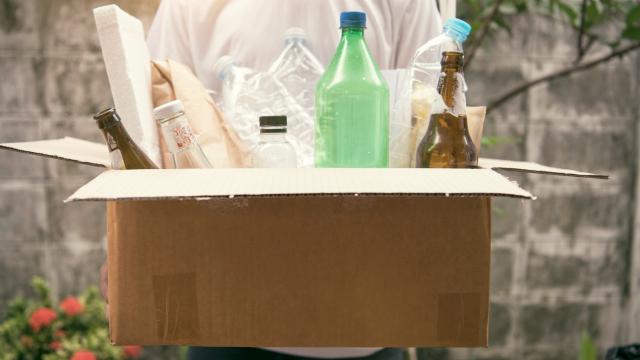
While we all have the best of intentions when it comes to recycling, sometimes we stuff up. It happens. We’re only human. But if you think about how many times we’ve all guessed which bin to chuck an empty jar in, or assumed it would be fine without cleaning it out — it adds up to be a lot when you consider we’re all letting ourselves off every now and again.
Of course, it’s the big corporations and governments that can be making drastic improvements, but we can still do our bit.
To find out how to prep our recyclables so they actually get recycled, we hit up the recycling experts over at Containers for Change Queensland. Marjon Wind, Manager of Circular Economy, says the most circular solution is to try and avoid packaging in the first place, or reuse it if you can.
All councils differ when it comes to their recycling standards, so it’s best to check your local requirements. But, there are some general tips to take note of.
So don your skintight Captain Planet suit (made out of recycled materials, of course), and get ready to recycle better. Here’s how.
Drink containers
First and foremost, all Queenslanders need to check whether or not their containers are actually eligible to be recycled on the Containers for Change Queensland website. Then, Marjon says to get rid of the lid — they’re too small for the recycling technology to do anything with. Instead, she suggests putting those lids inside another recyclable item like a yoghurt tub. Solved!
Next, on to the dilemma I regularly face when recycling: to rinse or not to rinse.
“You don’t need to rinse it out before recycling,” Marjon confirms to my cheers of joy. “But you may like to give it a quick rinse to reduce smells when storing.”
So, I guess follow your schnoz on that front, my friends.
Once all that’s sorted, you can return them to a Containers for Change Queensland refund point and collect 10c per container. Score!
Paper and cardboard
Before you even think of chucking your paper or cardboard into the yellow bin, check out whether it’s contaminated. If it’s wet it definitely can’t be reused or recycled. To the general rubbish it goes.
Now, the pizza box is hotly contested but it can actually be recycled. You just need to make sure all the food and napkins are out of it — pick those fallen bits of cheese and beef up and dispose of them in your mouth.
Thankfully, Marjon says many other takeaway boxes these days are now made out of plant-based materials like sugar cane, so you can just pop those into compost or a worm bin.
Glass bottles and jars
In good news for us lazy folks, you don’t need to remove labels on your glass, but Marjon does suggest rinsing them out to remove all food waste.
Annoyingly, not all glass is made the same. Marjon explains that some glass (ceramics, oven-proof glass like Pyrex and drinking glasses) can’t be put in your kerbside collection because they melt at different temperatures than regular ol’ glass.
Cartons
This one is also a bit tricky because the cartons can vary. Cartons over 1L (like beer cartons), are not a problem for your kerbside recycling. Just make sure to empty and flatten them first.
Tinned food cans
You need to make sure the can is actually made of steel to recycle it. “Use a magnet to double-check it’s steel,” says Marjon.”If the magnet sticks, it’s steel.”
Once you’ve done that nifty trick, empty the can, take the lid off and pop it inside the can. You should also squeeze the top of the can together before you pop it in the recycling to avoid any contaminants getting in there.
Aluminium foil
Your foil needs to be reasonably clean to be recycled. To prep it, scrunch it into a large ball. But go easy with the squeezing because if you make it too small, it will be missed by the magnet that pulls all the alfoil and metal out of the recycling.
Plastic
“Plastic is always a tricky one,” Marjon says. “So the easy rule is if you can squeeze it into a ball (like cling film, wrappers, chips packets) it generally cannot go into the yellow-top bin.”
And while we’re talking plastic, don’t put any of your recyclables in a plastic bag — they won’t be recycled if you do! Just toss it all into the kerbside recycling loosey goosey.
Helpful, eh? I certainly feel a touch guilty for doing a lot of the above wrong in the past but hey, we live, learn, reuse and recycle. If you want more guidance on recycling, head to your local council site.
If you live in Queensland and want to make some coin for recycling containers, check out Containers for Change Queensland.

Leave a Reply
You must be logged in to post a comment.